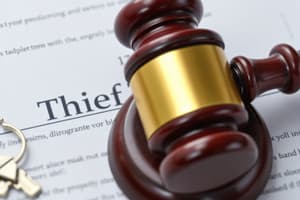Podcast
Questions and Answers
Belonging to Another S5(1) it is the possession, control of property or any proprietary interest is sufficient. Possession or control doesn’t have to be ______ and is useful where B robs A and C robs B so C can still be guilty of theft.
Belonging to Another S5(1) it is the possession, control of property or any proprietary interest is sufficient. Possession or control doesn’t have to be ______ and is useful where B robs A and C robs B so C can still be guilty of theft.
lawful
Like if a hired car is stolen the thief can be charged with stealing it from the hirer and as the car-hire firm still owns the car the thief could be charged with stealing it from them. Possession or control doesn’t have to be ______ and is useful where B robs A and C robs B so C can still be guilty of theft.
Like if a hired car is stolen the thief can be charged with stealing it from the hirer and as the car-hire firm still owns the car the thief could be charged with stealing it from them. Possession or control doesn’t have to be ______ and is useful where B robs A and C robs B so C can still be guilty of theft.
lawful
R v Turner (No 2) - an owner can steal their own property if another has ______ of it.
R v Turner (No 2) - an owner can steal their own property if another has ______ of it.
possession
R v Woodman - a person or business can be in possession or control of property even though they don't know the property is on their ______.
R v Woodman - a person or business can be in possession or control of property even though they don't know the property is on their ______.
R (on the application of Ricketts) v Basildon Magistrates Court (2010) - when goods are left for someone the goods belong to the original owner until the new owner takes ______ of them.
R (on the application of Ricketts) v Basildon Magistrates Court (2010) - when goods are left for someone the goods belong to the original owner until the new owner takes ______ of them.
R v Webster - if another person still has a proprietary interest in the item despite D owning, controlling or in possession of the item they can still be guilty of ______.
R v Webster - if another person still has a proprietary interest in the item despite D owning, controlling or in possession of the item they can still be guilty of ______.
In situations where D is acting dishonestly and caused a loss to another or has made a gain, a D can still be guilty of theft even though the property belongs to another - Trust property where a trustee can steal it, Property received under an obligation, and Property received by another's mistake are the ______ ways a D can still be guilty of theft.
In situations where D is acting dishonestly and caused a loss to another or has made a gain, a D can still be guilty of theft even though the property belongs to another - Trust property where a trustee can steal it, Property received under an obligation, and Property received by another's mistake are the ______ ways a D can still be guilty of theft.
Section 5(3) of the Theft Act 1968 states that property is still belonging to another for the purpose of the theft act when there is an ______ to retain and deal with the property in a particular way, as seen in the case of R v Klineberg and Marsden where D is guilty of theft when they don't follow that way. There can even be an ______ despite it being informal, e.g., between flatmates and paying a shared bill, as in the case of Davidge v Bunnett.
Section 5(3) of the Theft Act 1968 states that property is still belonging to another for the purpose of the theft act when there is an ______ to retain and deal with the property in a particular way, as seen in the case of R v Klineberg and Marsden where D is guilty of theft when they don't follow that way. There can even be an ______ despite it being informal, e.g., between flatmates and paying a shared bill, as in the case of Davidge v Bunnett.
Section 5(4) of the Theft Act 1968 deals with property obtained through ______. Property received by a ______, as seen in the case of Attorney-General’s Reference (No. 1 of 1983) (1985), where there is a legal duty to return the property. Sometimes there's no legal obligation to restore ______n money, as in the case of R v Gilks. Only resort to S3 + 4 if it's done dishonestly with the courts initially thinking that if a V consents to the theft then it is allowed but it's changed to not be so.
Section 5(4) of the Theft Act 1968 deals with property obtained through ______. Property received by a ______, as seen in the case of Attorney-General’s Reference (No. 1 of 1983) (1985), where there is a legal duty to return the property. Sometimes there's no legal obligation to restore ______n money, as in the case of R v Gilks. Only resort to S3 + 4 if it's done dishonestly with the courts initially thinking that if a V consents to the theft then it is allowed but it's changed to not be so.
Trust property where a trustee can steal it, Property received under an obligation, and Property received by another's mistake are the ___ ways a D can still be guilty of a theft even though the property belongs to another.
Trust property where a trustee can steal it, Property received under an obligation, and Property received by another's mistake are the ___ ways a D can still be guilty of a theft even though the property belongs to another.
Section 5(3) of the Theft Act 1968 states that property is still belonging to another for the purpose of the theft act when there is an ___ to retain and deal with the property in a particular way, as seen in the case of R v Klineberg and Marsden.
Section 5(3) of the Theft Act 1968 states that property is still belonging to another for the purpose of the theft act when there is an ___ to retain and deal with the property in a particular way, as seen in the case of R v Klineberg and Marsden.
Section 5(4) of the Theft Act 1968 deals with property obtained through ___. Property received by a ___ is addressed in the case of Attorney-General’s Reference (No. 1 of 1983) (1985), where there is a legal duty to return the property.
Section 5(4) of the Theft Act 1968 deals with property obtained through ___. Property received by a ___ is addressed in the case of Attorney-General’s Reference (No. 1 of 1983) (1985), where there is a legal duty to return the property.
Flashcards are hidden until you start studying
Study Notes
Situations Where D Can Be Guilty of Theft
- Trust property can be stolen by a trustee, as they have an obligation to retain and deal with the property in a particular way (R v Klineberg and Marsden)
- Property received under an obligation can be stolen, even if the obligation is informal (Davidge v Bunnett)
- Property received by another's mistake can be stolen, with a legal duty to return the property (Attorney-General's Reference (No. 1 of 1983) (1985))
The Meaning of 'Belonging to Another'
- Possession, control of property, or any proprietary interest is sufficient to be considered "belonging to another" (S5(1) of the Theft Act 1968)
- Possession or control doesn't have to be lawful (R v Turner (No 2))
- A person or business can be in possession or control of property even if they're unaware of it (R v Woodman)
- Goods left for someone belong to the original owner until the new owner takes possession of them (R (on the application of Ricketts) v Basildon Magistrates Court (2010))
- If another person still has a proprietary interest in an item, D can still be guilty of theft, even if they own, control, or possess the item (R v Webster)
Studying That Suits You
Use AI to generate personalized quizzes and flashcards to suit your learning preferences.




